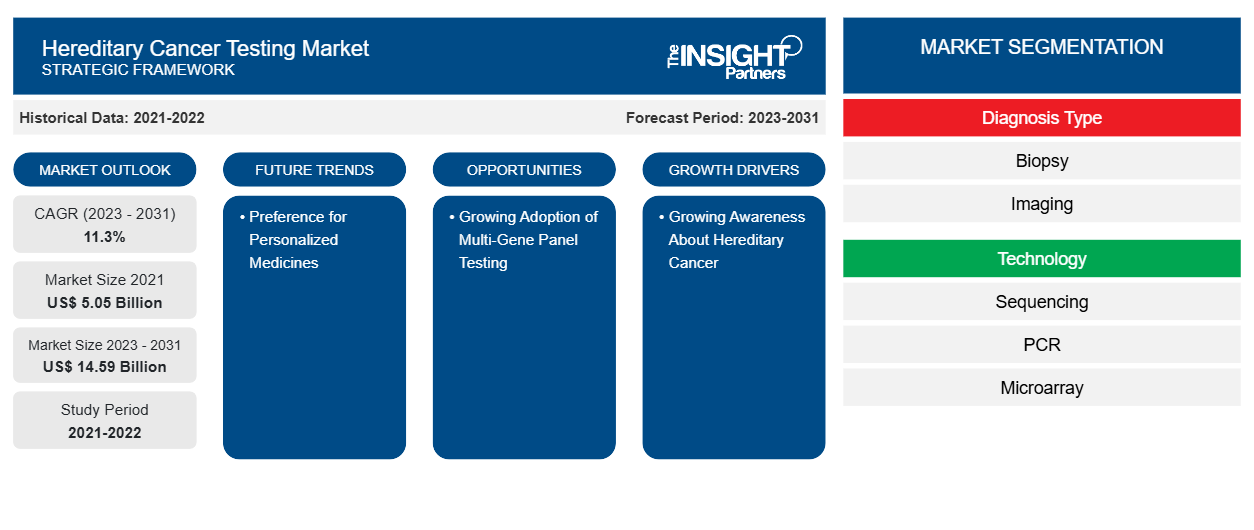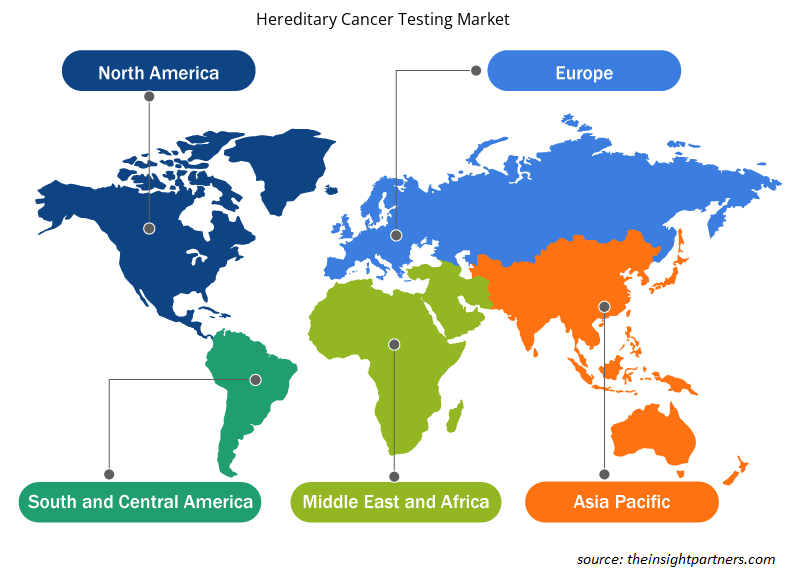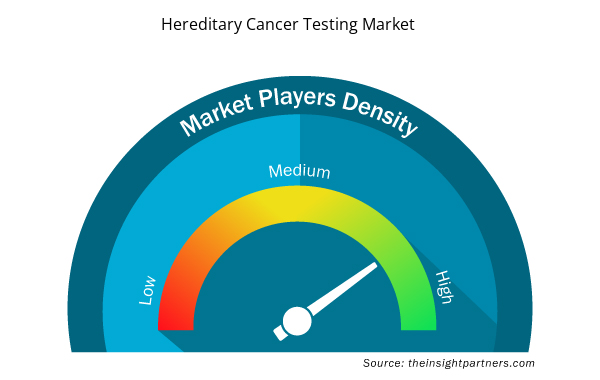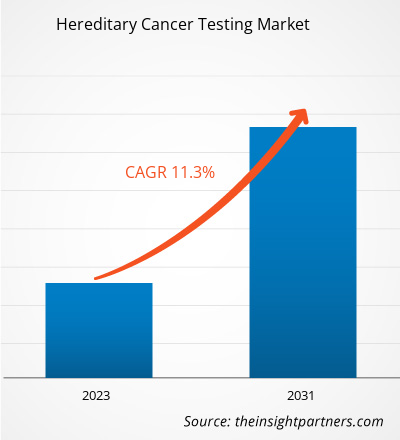The hereditary cancer testing market size was estimated to be US$ 5.05 billion in 2021 and US$ XX billion in 2023 and is expected to reach US$ 14.59 billion by 2031; it is estimated to record a CAGR of 11.3% in 2023–2031. increasing prevalence of hereditary cancer and growing awareness about hereditary cancer are driving factors. Preference for personalized medicines will likely remain key to hereditary cancer testing market trends.
Hereditary Cancer Testing Market Analysis
Cancer is a genetic disorder caused by definite variations in genes that govern cell functioning, particularly affecting their growth and replication. Hereditary genetic mutations cause 5–10% of all cancers. The researchers have related mutations in particular genes with more than 50 hereditary cancer syndromes affecting individuals developing certain cancers. Furthermore, ~5–10% of breast cancers are related to the mutated genes inherited from parents. Variations in the BRCA1 and BRCA2 genes are prevalent. Women with a BRCA1 mutation have ~72% lifetime risk of growing breast cancer, while those with the BRCA2 mutation have ~69% risk of the same.
Hereditary Cancer Testing Market Overview
Asia Pacific is the fastest-growing market for hereditary cancer testing. The region has huge potential for hereditary cancer testing market players owing to government support in countries like South Korea for cancer awareness and other initiatives. The demand for genetic sequencing in China is growing, mainly due to the country’s rising middle class, elderly population, and increasing healthcare system. As per WHO data, the Chinese government has implemented the “Healthy China 2030” plan, which is useful for its population.
Customize This Report To Suit Your Requirement
You will get customization on any report - free of charge - including parts of this report, or country-level analysis, Excel Data pack, as well as avail great offers and discounts for start-ups & universities
Hereditary Cancer Testing Market: Strategic Insights

- Get Top Key Market Trends of this report.This FREE sample will include data analysis, ranging from market trends to estimates and forecasts.
Customize This Report To Suit Your Requirement
You will get customization on any report - free of charge - including parts of this report, or country-level analysis, Excel Data pack, as well as avail great offers and discounts for start-ups & universities
Hereditary Cancer Testing Market: Strategic Insights

- Get Top Key Market Trends of this report.This FREE sample will include data analysis, ranging from market trends to estimates and forecasts.
Hereditary Cancer Testing Market Drivers and Opportunities
Growing Awareness About Hereditary Cancer
The awareness regarding hereditary cancer conditions is growing due to various efforts made by the government. In the past decade, public medical, health, and scientific communities have invested in spreading awareness regarding hereditary cancer conditions, with a major focus on hereditary cancer risk, family history, and genetic testing for inherited cancer liability. Furthermore, manufacturers are focusing on adopting strategies such as product launches and approvals, R&D investments, government funding, and partnerships to provide easy access for patients worldwide. For instance, in April 2024, Ambry Launched the Inter-Organization Cancer Genetics Clinical Evidence Coalition (INTERACT) collaboration to spur hereditary cancer testing, aiming to increase access to specialized genetic testing.
Growing Adoption of Multi-Gene Panel Testing – An Opportunity
A multi-gene panel eliminates running multiple assays for different cancer or variant types. Copy number variation (CNV) is a common source of genetic variation and is involved in many genetic disorders. It is also a critical component of a hereditary cancer diagnosis.
The UK Government and Genomic England have stated that all CNV analyses will now be performed by NGS rather than multiplex ligation-dependent probe amplification (MLPA). Due to its advantages, all laboratory processes will be streamlined and enable the detection of all SNVs, INDELs, and CNVs variants using a single workflow and analysis pipeline.
The adoption of multi-gene panel testing will be increased across various North American, European, and Asian countries.
Hereditary Cancer Testing Market Report Segmentation Analysis
Key segments that contributed to the derivation of the hereditary cancer testing market analysis are product diagnosis type, technology, and end user.
- Based on the diagnosis type, the hereditary cancer testing market is segmented into biopsy and imaging. The biopsy segment held the largest market share in 2023. However, imaging segment is anticipated to register the highest CAGR during the forecast period.
- Based on technology, the hereditary cancer testing market is segmented into sequencing, PCR, and microarray. The sequencing segment held the largest market share in 2023, and the same segment is projected to register the highest CAGR during the forecast period.
- Based on end user, the hereditary cancer testing market is segmented into diagnostic centers, hospitals, and clinics. The hospital segment held the largest market share in 2023. Moreover, the same segment is estimated to register the highest CAGR in the market during the forecast period.
Hereditary Cancer Testing Market Share Analysis by Geography
The geographic scope of the hereditary cancer testing market report is mainly divided into five regions: North America, Asia Pacific, Europe, Middle East & Africa, and South America/South & Central America.
The North America Hereditary Cancer Testing market is segmented into the US, Canada, and Mexico. The US held the largest share of the North American hereditary cancer testing market 2023. The projected growth of the hereditary cancer testing market in North America is driven by the rising number of cancer patients, increasing government funding, and rising incidence of genetic diseases among the population in the US and Canada during recent years. The government also took initiatives to create awareness regarding cancer among the population. For instance, the American Society of Clinical Oncology (ASCO) offers a course on cancer awareness to spread complete and essential knowledge of this condition, including hereditary cancer genetics.
Hereditary Cancer Testing Market Regional Insights
Hereditary Cancer Testing Market Regional Insights
The regional trends and factors influencing the Hereditary Cancer Testing Market throughout the forecast period have been thoroughly explained by the analysts at Insight Partners. This section also discusses Hereditary Cancer Testing Market segments and geography across North America, Europe, Asia Pacific, Middle East and Africa, and South and Central America.

- Get the Regional Specific Data for Hereditary Cancer Testing Market
Hereditary Cancer Testing Market Report Scope
| Report Attribute | Details |
|---|---|
| Market size in 2021 | US$ 5.05 Billion |
| Market Size by 2031 | US$ 14.59 Billion |
| Global CAGR (2023 - 2031) | 11.3% |
| Historical Data | 2021-2022 |
| Forecast period | 2023-2031 |
| Segments Covered |
By Diagnosis Type
|
| Regions and Countries Covered | North America
|
| Market leaders and key company profiles |
Hereditary Cancer Testing Market Players Density: Understanding Its Impact on Business Dynamics
The Hereditary Cancer Testing Market market is growing rapidly, driven by increasing end-user demand due to factors such as evolving consumer preferences, technological advancements, and greater awareness of the product's benefits. As demand rises, businesses are expanding their offerings, innovating to meet consumer needs, and capitalizing on emerging trends, which further fuels market growth.
Market players density refers to the distribution of firms or companies operating within a particular market or industry. It indicates how many competitors (market players) are present in a given market space relative to its size or total market value.
Major Companies operating in the Hereditary Cancer Testing Market are:
- Hologic Inc.
- Koninklijke Philips N.V.
- Quest Diagnostics Incorporated
- Myriad Genetics, Inc.
- Cancer Genetics Inc.
- Invitae Corporation
Disclaimer: The companies listed above are not ranked in any particular order.

- Get the Hereditary Cancer Testing Market top key players overview
Hereditary Cancer Testing Market News and Recent Developments
The hereditary cancer testing market is evaluated by gathering qualitative and quantitative data from primary and secondary research, which includes important corporate publications, association data, and databases. The following is a list of developments in the market for hereditary cancer testing:
- Exact Sciences Corp. announced the Riskguard hereditary cancer test launch in the United States. This test provides an individualized patient report that includes gene-specific and familial risks using a simple blood or saliva sample for 10 common cancers, including colorectal, endometrial, gastric, pancreatic, breast, prostate, skin, ovarian, kidney and endocrine. (Exact Sciences Corp /Press Release, February 2024)
- Devyser announced the launch of two new products, Devyser LynchFAP and Devyser BRCA PALB2. These kits offer efficient, targeted, and confident analysis of genes associated with increased cancer risk. Devyser LynchFAP provides a comprehensive solution to analyze PMS2 and 9 other genes associated with hereditary colorectal cancer syndromes (Source: Devyser, Press Release, June 2023)
Hereditary Cancer Testing Market Report Coverage and Deliverables
The “Hereditary Cancer Testing Market Size and Forecast (2021–2031)” report provides a detailed analysis of the market covering below areas:
- Market size and forecast at global, regional, and country levels for all the key market segments covered under the scope
- Market dynamics such as drivers, restraints, and key opportunities
- Key future trends
- Detailed PEST/Porter’s Five Forces and SWOT analysis
- Global and regional market analysis covering key market trends, major players, regulations, and recent market developments
- Industry landscape and competition analysis covering market concentration, heat map analysis, prominent players, and recent developments
- Detailed company profiles
- Historical Analysis (2 Years), Base Year, Forecast (7 Years) with CAGR
- PEST and SWOT Analysis
- Market Size Value / Volume - Global, Regional, Country
- Industry and Competitive Landscape
- Excel Dataset



Report Coverage
Revenue forecast, Company Analysis, Industry landscape, Growth factors, and Trends

Segment Covered
Diagnosis Type, Technology, and End User

Regional Scope
North America, Europe, Asia Pacific, Middle East & Africa, South & Central America

Country Scope
US, Canada, Mexico, UK, Germany, Spain, Italy, France, India, China, Japan, South Korea, Australia, UAE, Saudi Arabia, South Africa, Brazil, Argentina

 Get Free Sample For
Get Free Sample For